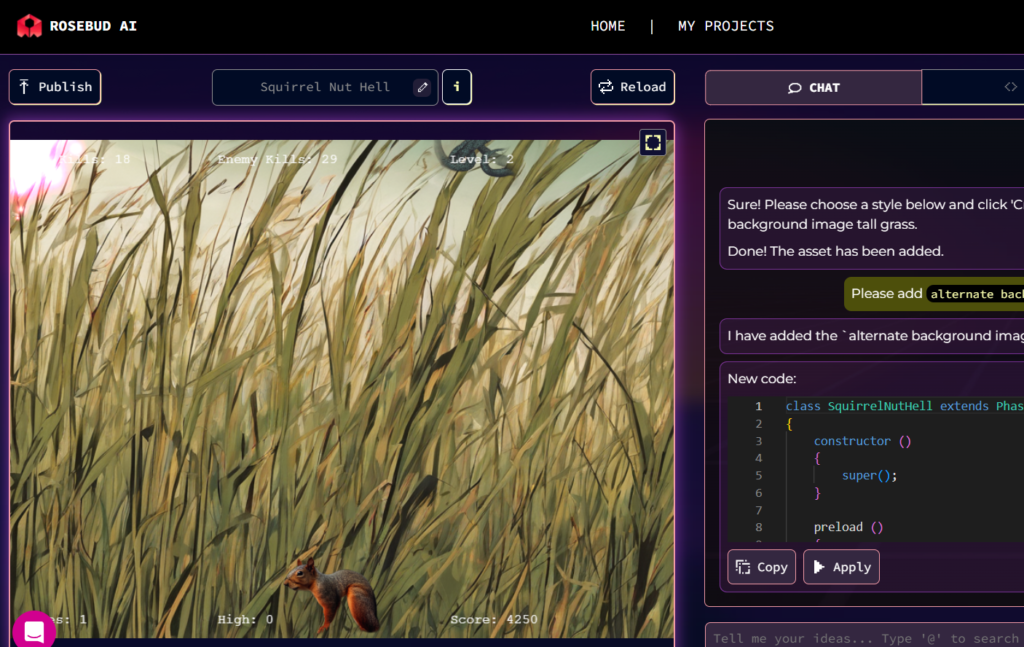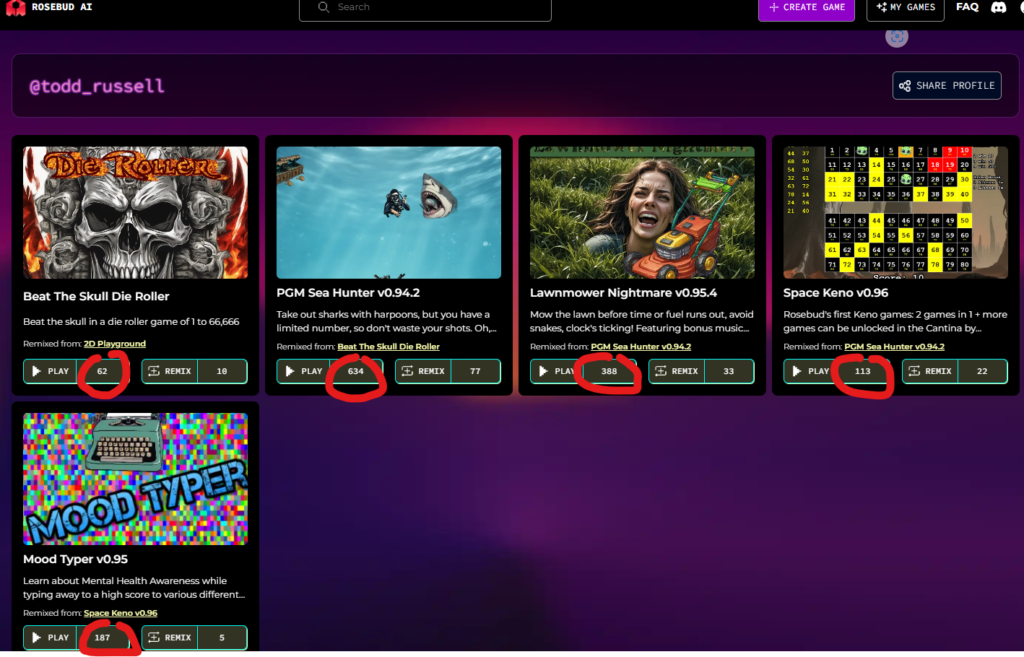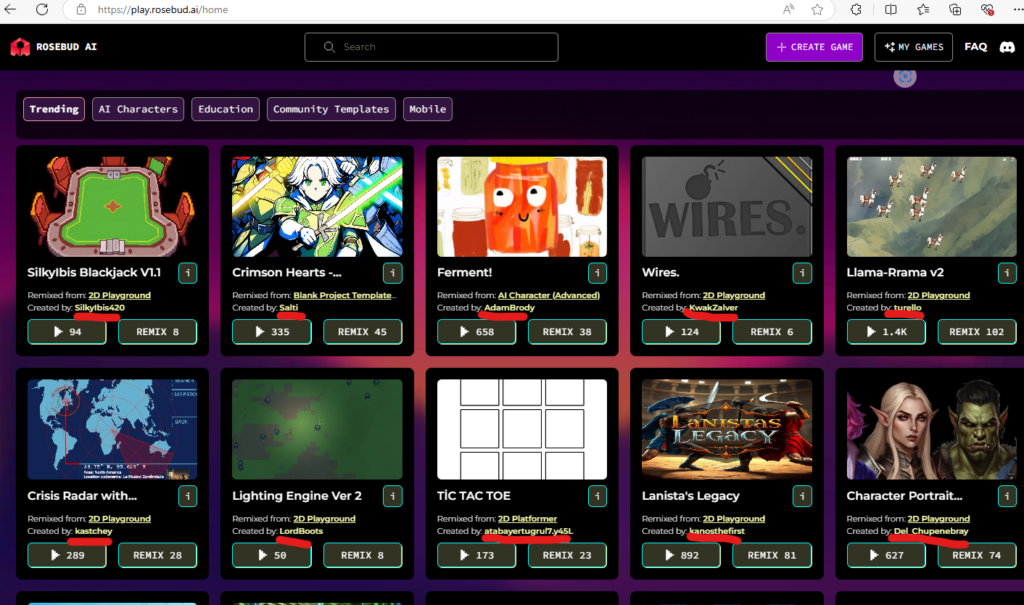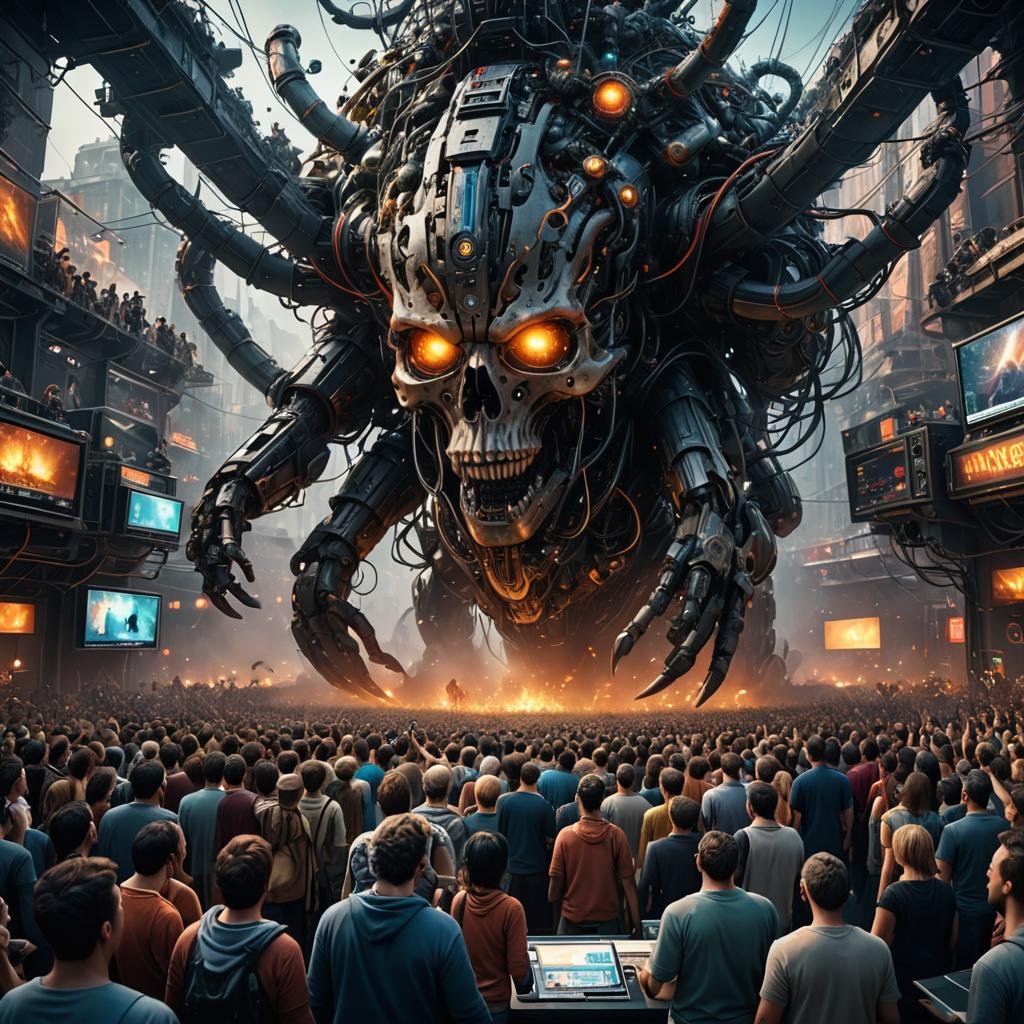Back in February I wrote a screed on how we don’t need completely AI generated games: OPINION: Google’s AI Genie Creating Faux 2D Platformer Games Likely Another Idea They Give Up on Too Soon
And, months later, after finally getting into the Rosebud.AI and trying out firsthand, I need to walk back some of those harsher tone and sentiments, similar to but not completely what I said about Suno (see: PGM Experiment: Suno AI Music Generator to Create Arcade, Videogame and Pinball Songs). Not walking it all back, however. Rosebud.ai does not simply let anybody type a single text prompt and have the AI generate a complete, playable game.
Not even close.

In the following video, the CEO Lisha Li makes creating a game using Rosbud.ai a series of a small, few text prompts. Even she has some hiccups, ironically, getting Rosie, the AI, to generate exactly the code she needs.
So, a non-programmer can’t exactly make a fully playable game using Rosebud.ai without some amount of tweaking. Not in my experience anyway. Can a total non-programmer make a very generic game with crude scoring and level design? Yes. How about an AI generated narrative story game (of which there are way too many awful ones in existence already)? Yes.
But what about a game with some real heart, passion and creativity? Something that doesn’t feel generic and lacking humanity. Something more polished? Something deep and involved?
Aye, there’s the rub.
After using Rosebud.ai myself, having programmed for the web, Windows and some limited mobile programs, for years in the past, having taught programming to others, as well as made and sold my own created games, my answer is:
Not quickly or easily.
The biggest problem with Rosebud.ai is that once you get away from a very basic, very simple game, and the code grows in complexity, the AI needs a hand from — you guessed it — a human being. And it can’t be in the form of a simple text prompt from somebody that doesn’t understand at least a little bit of what s/he is doing. While Rosebud technically can work with larger code bases, it becomes increasingly less useful the larger the code base. I found making relatively simple games under 1,000 lines of code to be the sweet spot for games made on this platform. Working with code beyond that is possible, but it’s going to require more human involvement and considerable organization.
Rosebud’s solution to the social/human factor needed in the game development is a vibrant, helpful community to fill the gaps. This might work for a little while, but questionable as a model of long term success. By relying on the community and an active Discord to encourage helping each other it feels a bit like they are using people — some of which are experienced programmers — to supplement AI shortcomings and downfalls.
Don’t get me wrong, what has been done to this point, and continues to be worked on regularly is impressive. Rosebud.ai has great potential, especially as a programming teaching tool, which seems to be the area it’s not-so-quietly targeting.
So, it will help a lot having some sort of game programming knowledge to know what to tell the AI. And, for those that have that knowledge, they will more than likely just dive directly into the generated code and patch or add the new code themselves versus trying to get Rosie to generate the code. Whereas somebody that doesn’t know is going to end up searching online learning docs, Discord, reading game programming and design tutorials — you know, the old-fashioned way of learning programming.
That said, Rosie does teach what it’s doing along the way, as each user text input is requested. That makes this a worthy supplemental teaching tool, which I like a lot. A non-programmer that desires to be a game designer can learn about the basic process using Rosebud. It might encourage some folks to pursue creating their own games using AI. It might just create more game designers and programmers.
And that’s a positive thing for gamers.
Rosebud is better than I thought, to borrow from the headline, for RAD (Rapid Application Devlopment). You can rough out a skeleton game much faster than writing the code yourself, unless you already have the basic code libraries written and templated yourself. Then it’s probably a wash in some areas, time-wise.
Where Rosebud.ai exceeds a typical developer IDE (Interactive Development Environment) like Visual Studio, is that the AI will create the framework and templates for you. In fact, if the current version of Visual Studio doesn’t do something like Rosebud.ai is doing, it will be soon enough (cough, Co-pilot, cough). Rosebud has plenty of competition either already here or on the way. I see significant potential in this Coding Buddy space area for AI that I only hinted at in that article months ago.
Leaning toward continuing to play around here and there with Rosebud.ai. It has piqued my curiosity, but I think some of its claims — like most things online these days — are overblown. You can’t just type a few sentences and have AI create a fully playable game using Rosebud.ai. You still need to either have Rosebud create the assets to add to the project or upload them yourself: you know, the character models, sprites, sounds and so on. Yes, Rosie can generate some of these for you, but each of those require user text prompts. Want a scoring system? Yes, you will need to add it yourself or use another text prompt and Rosie will add one for you. But it will be void of style like a (very) early PC game unless, again, you tell Rosie to style it more visually pleasing (using HTML). How about a high score leaderboard system? Sure, but to receive the desired result you’re more than likely to need to tweak the code with follow-up text prompts and/or editing the code directly.
Without the tweaking, you end up with a very bland, rudimentary end product that isn’t going to appeal to the vast majority of 2024 gamers.
Again, the more complex your game, the less likely Rosebud.ai is going to be the best development tool. However, you can come up with interesting rough prototypes using Rosebud.ai and certainly existing or former game programmers can use this system in conjunction with their own skillset to create some fun, playable games. And to my fellow advanced Rosebud developers, yes, you can use Rosebud to do some very advanced stuff. It’s not like it’s limited to only beginners and hopefully this article doesn’t leave that impression, but to who this most benefits (besides the Rosebud team itself): I’m not quite certain.
My educated guess after months of research and, see below, I’m not just writing about this site without diving into it and conducting detailed research. I was and still am, to a lessening degree, a significant contributor to the Rosebud community. Or, maybe past tense, I was. I’ve pulled back somewhat lately because this article is done and I’m left with the all important creative question: what’s the point? Here’s a look at actual games played to date for the projects I created with Rosebud.ai:

Adding up all those red circled dots above for my five published projects and it’s less than 2,000 “plays.” That is unique players, I believe, with unique browser environments, so it could be the same player with multiple browser instances. That said, if you play a game thousands of times within that environment, Rosebud’s system appears to only count this as “1” play, thus preventing people from spamming these published play counts and making these stats fairly useless. It would be trivial to get around this system, but I’ve never been about spamming stats for marketing purposes.
The sobering reality is this: not that many people are playing these games. Not just my games, which were lovingly created by both machine (Rosie) and man (me), but all Rosebud games. There are a few games that show play counts into the thousands, but none that exceed 5,000, that I saw. Not at this time, anyway. That’s pretty illustrative that the gamer audience is still pretty tiny comparatively.
Let’s face it, there is bias against AI. At this time, I’m not going to get too deep into whether or not gamers should be interested in primarily AI-generated games, because with my research to date, it’s still very nascent technology, but it’s coming along and it’s not entirely without value. The important point that gamers should take away is as follows:
Fun, playable games can be created using Rosebud.
I’m not condemning Rosebud for a lack of popularity with gamers, but rather being honest about what’s there right now. If you spend a bunch of time putting together an amazing game, then almost certainly it’s a very limited audience that will receive it. This isn’t preventing a developer from taking that idea from their Rosebud prototype project outside and doing something more commercially viable with it. Hint, hint.
It’s important to note that the team at Rosebud does an admiral job of promoting the games and non-game projects, many highlighting AI, within their community. Rosebud has their own YouTube channel and they (briefly) cover just about every new project that is published through their system. Kudos to them for all they do for their community.
One specific area of improvement, however, is their promotion of the individual authors in their own project listings. For example, look at their own trending game project and despite numerous authors pointing this out, there are no links to the authors project pages, only to the games/projects.

All those red underlines are not linked to the author’s project pages, as should be. This needs to change ASAP. They should be promoting the authors equally to the individual games/projects themselves. In the Rosebud Discord, they do a great job promoting the authors, but out here on their own website, it’s like, “hey, we don’t want to show you more projects by those that developed these games.” A major oversight.
Let’s get to the bottom line.
If you already know game programming, Rosebud.ai is worth a look. If you know nothing about programming a game, but want to see if Rosebud.ai will help you create a basic game, it could be one potentially helpful place to start, but will stop short of recommending it in its current state.
Here at PGM, we’ve spotlighted some games I’ve created using Rosebud.ai, all completely FREE to play:
- Play PGM Sea Hunter inspired by Stern Pinball Jaws Shark Hunter
- Play Lawnmower Nightmare and Celebrate AI Kills Debut Album
- Play Space Keno
- (newest) Play Mood Typer the 5th PGM Original Browser Game
For those that want to use AI to generate music for their Rosebud project, check out Suno.com (see and hear Suno-created PlayGamesMore songs here: https://suno.com/@playgamesmore). This will create music from text prompts — entire songs with verses, repeating choruses. Once created, you could take this music and use as backing music for your Rosebud game. That’s what I’ve done with several projects.
For AI-generated images, PGM uses Nightcafe (see my profile here: https://creator.nightcafe.studio/u/todd_russell). Again, this could be a supplemental image asset AI generation site to/for Rosebud.AI games you create.
In closing, programmers right now do not have to worry about AI game generation — at least at Rosebud.ai level — replacing them any time soon, but there is value in sites like Rosebud. More from an educational and early prototype standpoint. It’s definitely worth at least checking out, if you have ideas for programming games, but are brand new to the world of programming, you might end up frustrated that it isn’t as easy as typing a text prompt and having AI generate images or music. Not yet, anyway, and probably not for quite some time into the future.
Happy gaming creation to you!

Good way to start learning how to basic program. Might give it a try to learn it. Love the Sea Hunter game!